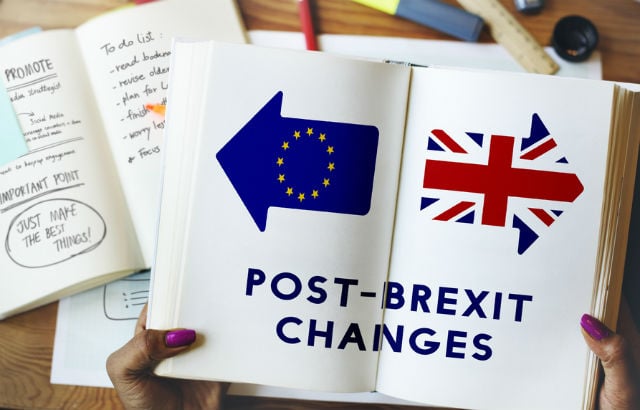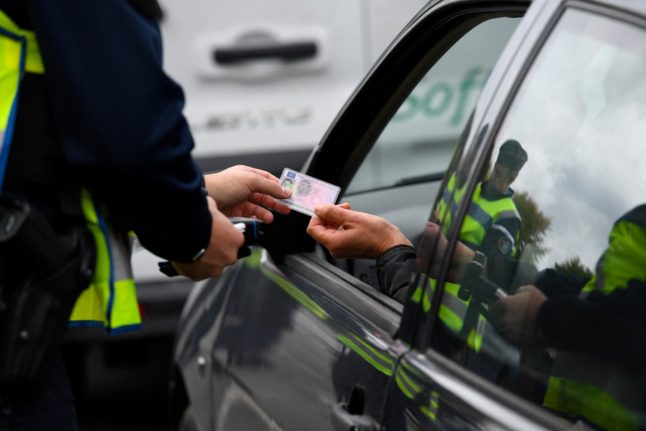We've now entered the crunch time for Britain's departure from the EU.
On Wednesday British PM Theresa May presented the text of the deal she has agreed with Brussels to her divided cabinet. If they give it the green light then it must still be ratified by individual EU countries and most importantly it must also win the backing of the British parliament. If it doesn't then anything could happen, including a second referendum or more worryingly a no-deal exit.
For up to date news and reaction to Theresa May's draft deal you can visit our LIVE blog
In other words, there's a long way to go in a short space of time, with Britain set to officially leave the EU at midnight on March 29th.
“There's no doubt that for citizens' rights a deal is better than no deal, so there are 5 million people today with their hearts in their mouths,” Kalba Meadows from Remain in France Together and British in Europe told The Local.
“But even if the deal is accepted by the cabinet today there's a long way to go.”
The citizens' rights part of Britain's 500-page withdrawal agreement from the EU was drawn up back in March – although not set in stone – when London and Brussels came to “complete agreement” on the thorny subject.
Wednesday's draft is not believed to contain any new elements that affect citizens rights with a spokesman for the EU Commission telling The Local: “The citizens’ rights part of the Withdrawal Agreement was agreed in full back in March.”
That means Brits in the EU will lose the right to onward freedom of movement – the right move to another EU country – at the end of the transition period.
Campaigners insisted on Wednesday that although it was drawn up in March the citizens rights part of the agreement has not been “signed off” and it hasn't been ring-fenced, meaning all the agreed rights will be lost if Theresa May's deal is rejected and Britain leaves the EU without an agreement.
Brian Robinson from Brexpats Hear Our Voice told The Local on Wednesday: “We have been repeatedly saying that the claims by the British government that 'they have delivered on citizens' rights', is entirely false.”
“The draft agreement only touches upon some treaty rights and ignores the rest. The draft has not been ring-fenced, as we have constantly asked for it to be, and the government still talks about 'no deal being better than a bad deal'. In the event of no deal, our rights will be lost.”
Here's a recap on what was agreed back then and importantly what was left out, with the help of British in Europe, the campaign group representing Brits across the EU.
They have described the withdrawal agreement as having “more holes than a piece of Emmental cheese.”
READ ALSO:
LIVE – Brits in Europe hold their breath as Theresa May presents deal to cabinet

- If you are legally resident in an EU country then you can stay, albeit you will probably have to apply to authorities in order to secure this status (see below for more).
- The right to stay is not only guaranteed for those already living in the EU and those who arrive before March 29th, but also those who come to the EU before the end of the transition period, which currently is 31st December 2020. Although there is a chance that the transition period could be extended even further.
- Brits will only lose those rights if they spend five continuous years away from the EU country the are living in.
- The current EU laws on the right of residence will apply meaning Brits in the EU are not obliged to meet any conditions for the first three months of their stay, but after that they must be working or self-employed, self-sufficient or a student. Alternatively they can be a family member of someone who meets these conditions.
- After 5 years of meeting these conditions then you will earn the right to stay permanently. Anyone with less than five years residence under their belts by the end of the transition period will be allowed to stay on under the same conditions until they can claim permanent residency.
- Britons in the EU will enjoy the continued right to reciprocal healthcare. So those pensioners who have cover under the S1 scheme or will be eligible for one when they retire will continue to have their healthcare funded by the UK. For British workers in EU countries who pay into the national health scheme then, the rules will remain as they are now.
- EHIC health cards will also continue to cover travel across the EU.
- Pensions will be uprated – meaning your UK state pension will be increased annually as it has been for those living in the UK or in the EU up to now.
- Disability benefits will also be “exported” as they are now.
- Frontier workers who live in one country and work in another will have the right to continue to work in each country.
- Close family members including spouses, civil partners and dependent children will be able to join you living in an EU country if you are legally resident. British in Europe points out that: “This will apply for the whole of your lifetime. If you have children after the effective date they also are protected under the withdrawal agreement if you and the other parent are also protected or a national of the country you live in.”
But where's our Freedom of Movement gone?
Continuing freedom of movement – which includes the ability to move, live and work in another EU country other than the country of residence – has not been included in the latest withdrawal agreement agreed by London and Brussels.
This is much to the anger of citizens' groups in the EU.
Jane Golding, Co-Chair of British in Europe said: “We were told in March that citizens’ rights were a done deal and that discussions on this would not be re-opened. However it is clear from the text that some changes have in fact been made, meaning that it is unacceptable and upsetting that free movement – a lifeline for many of us – has been excluded when both sides knew it was critical for us.
In the small print of the March agreement it said the issue of freedom of movement was “outside the scope” of the initial negotiations, meaning the rights of Brits living in France to be able to move and work freely in other EU countries may depend on how trade negotiations go.
It may still be included in any future UK-EU agreement with Britain signalling that they would seek to give Britons in the EU the right to onward movement as part of negotiations over the “future relationship”.
Other rights that were not included in the March agreement are on matters such as the right to provide cross-border services as self employed people, recognition of some professional qualifications and the right to be joined by a future spouse or partner who you were not in a relationship with before the end of the transition period.
How happy should Brits in Europe be?
British in Europe say this: “It’s reasonable to say that for those who are happily settled in their country of residence, work solely in that country, have retired there or are pre-retired, have no wish or need to move to or work or study in another EU country, fulfill all the requirements for exercising treaty rights (see here) and don’t rely on professional qualifications, then your rights should be covered.”
One of the major downsides is that EU countries may adopt a “constitutive system” meaning Brits would have to apply for the new status, meaning they would have to prove they had built up five years of legal residence (see bullet point two above) and perhaps undergo other checks such as criminality checks.
This is likely to be case given that the UK are to implement this under their “settled status” scheme and EU countries are likely to reciprocate.
This could cause problems for those who may not be able to prove they are or have been (for 5 years) self-sufficient. “The draft deal says :the deadline for submitting the application shall not be less than 6 months from the end of the transition period.”
For example in France there have been reports of Britons being turned down for residency permits and being asked to leave the country.
Many others are too worried to apply for the residency permits fearing they won't be able to prove they are self-sufficient and not a burden on the country's social security system, which they are being advised to do by the country's Interior Ministry, for fear they will be turned down and asked to leave.
The problem is after Brexit a new kind residency permit are likely to become obligatory.
“Some people would struggle to find the proof that they meet the statutory requirements of ‘legal residence’ and as we all know, bureaucracies can make mistakes. This is one of our major objections,” say British in Europe.
For more information on the citizens rights part of the withdrawal agreement you can visit the British in Europe website.



 Please whitelist us to continue reading.
Please whitelist us to continue reading.
Member comments